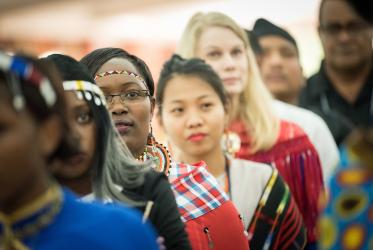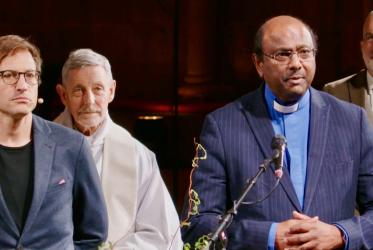By Kristine Greenaway*
Two major crises have marked the months since the World Council of Churches (WCC) called Katalina Tahaafe-Williams to work in Geneva on its migration, indigenous, and multicultural ministry programmes. When she took up the job in October, the European refugee crisis was in full flow. Then in November, terrorists attacked Paris.
The Tongan-Australian theologian immediately found herself working flat-out to organize a multilateral consultation on the refugee crisis, co-hosted with United Nations agencies, and a WCC seminar on mission with migrants.
“I hit the ground running,” Tahaafe-Williams says. “I happen to be in a position that is right in the middle. In the four months since I have arrived, it’s just been go-go-go. But I thrive in situations like that.”
Tahaafe-Williams brings extensive experience in multicultural ministry and migration to her role as programme executive for Mission and Evangelism. Prior to moving to Geneva, she worked as a Consultant for Multicultural Ministry with the Uniting Church in Australia. Before that she worked in the United Reformed Church in the United Kingdom as assembly secretary for Racial Justice, Multicultural Ministry, and Inter Faith Relations. She has a Ph.D. in Multicultural Mission and Ecclesiology from Birmingham University in the UK, and has taught in theological seminaries. Her experience includes working with Indigenous peoples in New Zealand and Australia.
“WCC’s general secretary is keen that WCC responds in an appropriate way to the humanitarian crisis that is happening today on the doorstep of the ecumenical movement. Member churches in Europe are catering to the needs of refugees as they can – sometimes with very limited resources,” Tahaafe-Williams told WCC in a telephone interview.
By organizing the WCC-UN High Level Conference on refugees, held in Geneva in January, WCC is reclaiming its historic role of brokering collaboration among governments, UN agencies and churches. From the WCC’s earliest days, the issue of safe passage for refugees has been at the heart of its mandate. Even before the organization held its founding assembly in 1948, European ecumenists were helping Jewish refugees fleeing Nazi persecution to reach safety in Switzerland.
The impact of the Paris attacks on migrant churches
The terrorist attacks in Paris on November 13 coincided with the final day of a seminar on Multicultural Mission and Ministry planned by Tahaafe-Williams in partnership with The United Church of Canada and the Presbyterian Church (USA).
“WCC member churches are struggling to receive and integrate migrants in the face of xenophobia, racism and insularity,” Tahaafe-Williams notes. “The Paris attacks fuel the fire of prejudice in folks who claim that it is ‘all the fault of the immigrants’. So refugees are now in the frontline of blame.”
Tahaafe-Williams believes WCC has a role to play in analysing why conflicts happen that force people to leave their home countries and in responding to the needs of those who are displaced and of those seeking to help them. She arrived just as WCC downsized its staff team due to losses in revenue tied to currency exchange rates. The rights advocate notes wryly the irony that at a time of so much need the council is forced to downsize.
A bicultural, ecumenical background
Born into the Methodist Church of Tonga, Tahaafe-Williams was raised in the Uniting Church in Australia. Both her parents are Tongan. Watching them experience racism has shaped her service to the church.
“My Tongan roots and Australian upbringing have made me ‘biculturally literate’,” she says. She is “passionate” about liturgy and worship that is contextually rooted and spiritually grounded and says multicultural worship and liturgy feed and nourish her.
Tahaafe-Williams is deeply committed to “mission from the margins” and “invigorated” by the opportunity to make a contribution to WCC’s work in this area.
In her work on migration and with migrant churches, Tahaafe-Williams will draw on her experience of how newcomers create communities of faith in their host country.
“Migrant churches are critical to the integration of migrants into society. But there is a risk of ghettoization and a ‘bubble existence’ as mono-cultural churches. Creating links with mainline historic churches in their new country can be a stepping stone towards integration,” she says.
Tahaafe-Williams will be drawing on all these threads of experience as she meets in the coming weeks with the Executive of the Commission on World Mission and Evangelism to draft plans of action for the coming year, one that promises to be as “invigorating” as her first four months.
More information on WCC work on migration (including conference documentation)
WCC/UN conference calls for coordinated action on refugee crisis (WCC press release of 20 January)
*Kristine Greenaway is a former WCC communication director with extensive experience in covering stories about global and local ecumenism.








